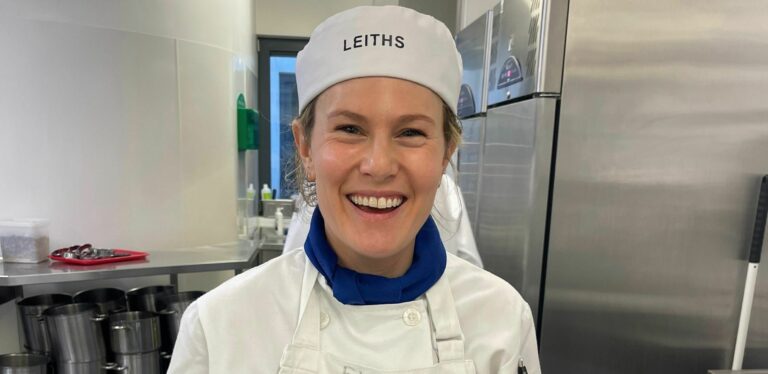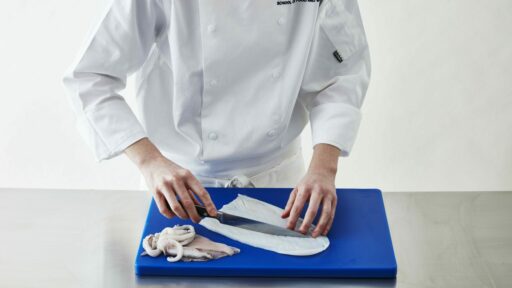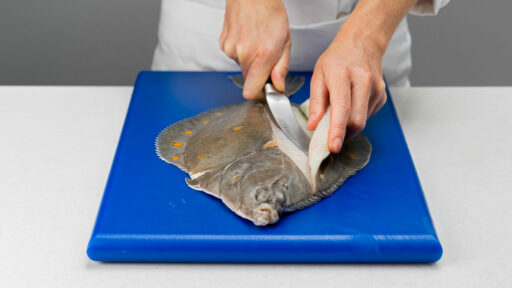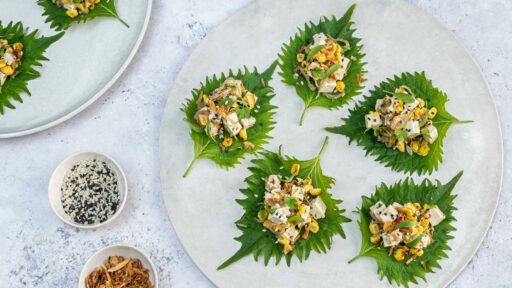Ever wondered what life really is like as a Leiths Diploma student? We caught up with Diploma student Emily Crocker to get a taste of her average day. Emily started her journey with us last September as a day time Essential student. Fast forward to now and Emily is completing her final term of the Diploma!
A day in the life of a Diploma student:
My alarm goes off at 6:15am every morning. It used to be 6:10 but the extra five minutes makes me feel better about getting up so early. First thing I do is make a cup of tea. Yorkshire Tea specifically, brewed for two minutes with a splash of milk. I’m a northern girl so I don’t feel right if my day doesn’t start with tea.
In the winter months I always turn to porridge for breakfast. It feels nourishing and virtuous (at least until I top it with lashings of silky peanut butter). As a child, cold days meant bowls of creamy rice pudding topped with brown sugar. Cooked slowly overnight, I would sneak some first thing in the morning and then have second helpings after dinner. My ritual has moved on a little since then but it still has the same warming, hug-in-a-bowl quality you crave when sunshine is in short supply.
The commute to school takes me nearly two hours so I need to be out the house no later than 7:15am. If I’m lucky, I will make it to the station in time to get a ‘proper’ coffee from the little vendor on the platform. When I say proper, I mean they care about the quality of the ingredients they use and how the coffee is made. I used to own a coffeeshop in Leeds so I know my arabica from my robusta.
On the train I will check over my time-plan for the day to make sure I am well-versed on what we are cooking that day. I check if there is any extra theory I need to read up on or a skills video I should watch. If not, I will listen to a podcast which will almost certainly be about food. At the moment I’m really enjoying the ‘The Food Chain,’ by the BBC World Service. It really speaks to my curiosity around food culture. I read History at university and that desire to understand how the past impacts the present has never left me. I’m fascinated by the different roles food plays in society and how it can tell you so much about a person or place.
When I get to school it’s time to don my whites. There is something strangely affirming about putting on a freshly pressed chef’s jacket. Paired with chequered trousers, a neckerchief, hat and apron you feel like the real deal. The changing room offers up a few spare minutes to chat to classmates about what we’re cooking that day. As cliched as it sounds, being surrounded by people who share your love of food and learning is what makes the experience of being here that much richer.
And it’s that shared energy and excitement we then carry through into the kitchen, along with our knife rolls and satchels of tools, eager to start the next cooking session. First, we’ll have a run through with the teachers. They tell us what the key learnings for the day are, and set their expectations too. There is normally a designated time we have to serve by so organisation and efficiency is key.
And then the fun begins. The atmosphere in the room changes. Everyone is working to a common goal- to create a really delicious plate of food. A bit like a great novel has stages in it’s narrative, a morning in the kitchen has its own unique ebbs and flows. The beginning is often slow and measured. An air of joviality in the room as people settle into the cook. Often, a gentle chatter passes through the kitchens, just audible above the sounds of chopping, sautéing and simmering pots.
As we reach the middle of the session, a step change in people’s energy is palpable. Like a dance, you need to glide, pivot and tip toe around the kitchen, always aware of the 15 other students you are sharing this hot, noisy space with. The smells, like the fruits of our labours, become ever more pronounced, jostling for dominance in the room like children in the playground.
As we near our service time, the chatter subsides and is replaced by the sound of frantic exclamations of ‘hot pan’ across the kitchen. Despite the building tension, there is something peculiarly meditative about cooking in a professional kitchen environment. Your mind becomes free of all other thoughts or worries and instead you are focused, fixated even, on the task at hand.
I call service as loudly as I can and write my name on the board. Some days, I’ll do this with pride, other days I’ll be more sheepish, harbouring some frustration about a mistake I have made. But I remind myself it’s all part of the process. At school, we’re taught to embrace the notion that failure is part of the learning journey.
We are given feedback immediately which I scribble into my notepad. It’s the only way to ensure I will remember what has been said. Then we have to do a full clean down of the kitchen before we can leave for lunch. I take off my whites (sometimes not looking so white anymore) and nip out to grab a salty snack and a coffee.
The afternoon session runs from 2pm and is normally a demonstration from one of the teachers, or occasionally a guest chef. I settle in with my notepad and a cup to tea, ready to soak up as much information as I can. Each demonstration normally covers a fundamental skill, technique or ingredient that we need to master. We watch dishes being prepared, learn the theory behind the methods and best of all, get to sample everything that is cooked.
Recently we had an offal dem – an area of cookery I knew very little about. Arriving to the dem room and being confronted with a bench lined with brain, heart, kidney, tongue and testicles was quite an experience! These are the moments that I know I’m exactly where I should be. Immersing myself in topics that are as fascinating as they are challenging.
We normally finish the day around 4.30pm. Despite being surrounded by food all day, I’m already thinking about dinner. I usually pick something up from the station which is fresh and easy to prepare, I don’t have the energy for lots of cooking when I get home. I write my time plan for the next day on the train and catch up on emails.
When I get home I spend some time with the children (there are four of them so this takes up most of the evening!). We have supper at the table while the older two sit with us and have what is fondly known in our house as ‘last food.’ Nothing fancy, usually a slice of buttery toast while we share stories about our days.
By 8pm, tiredness hits and we all climb the stairs together for an early night. The kids read in their bedrooms and me and my husband will watch an hour of television. I’m currently devouring the Great British Menu…thankfully he is as obsessed with food as I am so there are rarely any arguments about what to watch.
I normally finish the day with a cup of tea and something sweet. I’m trying to be good and opt for a yoghurt or some fresh fruit, but often I cave and reach for the secret chocolate stash instead.
Lights are out by 10pm usually. The rest of my night is spent dreaming intensely about food, time-plans, service times and anything else we have been doing that day. I think it’s my minds way of trying to process everything I’m filling it with. I was warned the Leiths diploma was an all immersive experience, but who knew that meant cooking in your sleep too.
Interested?
Explore more of our Professional Courses:




